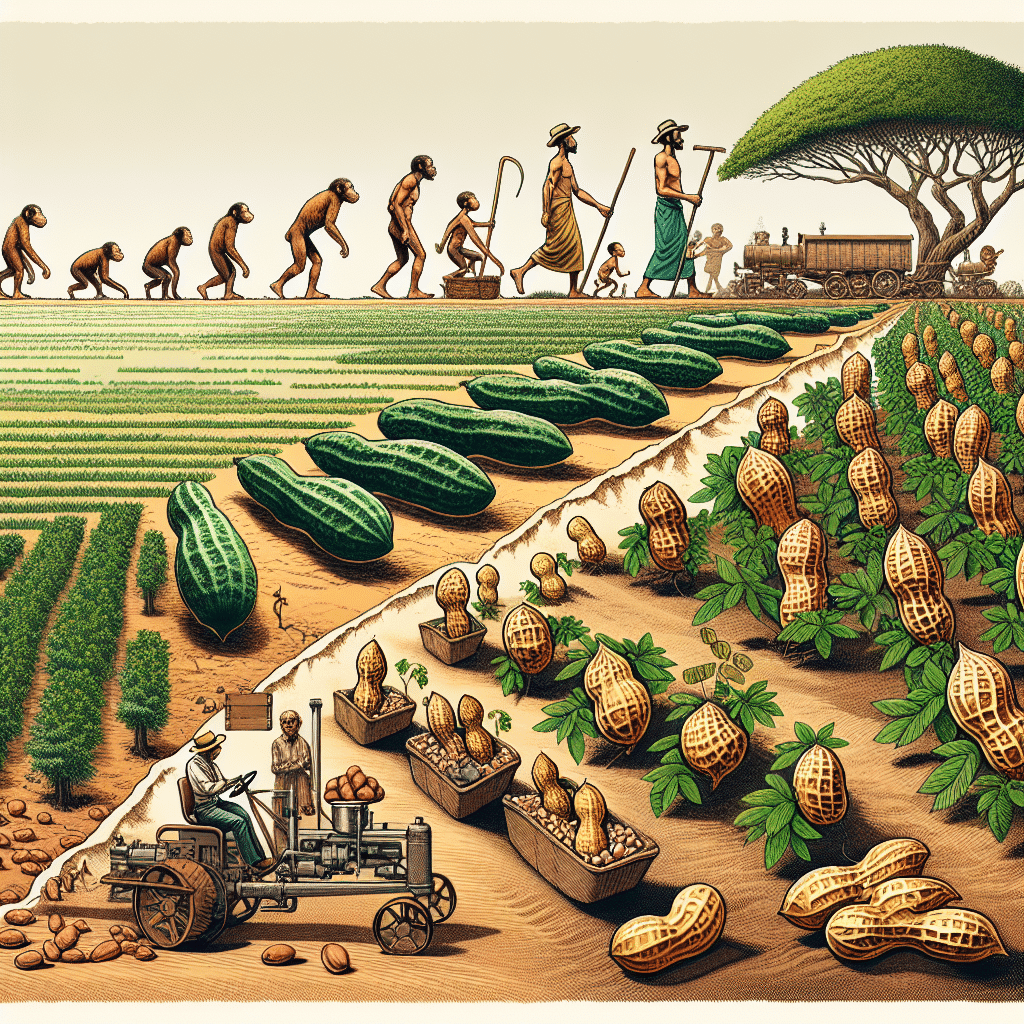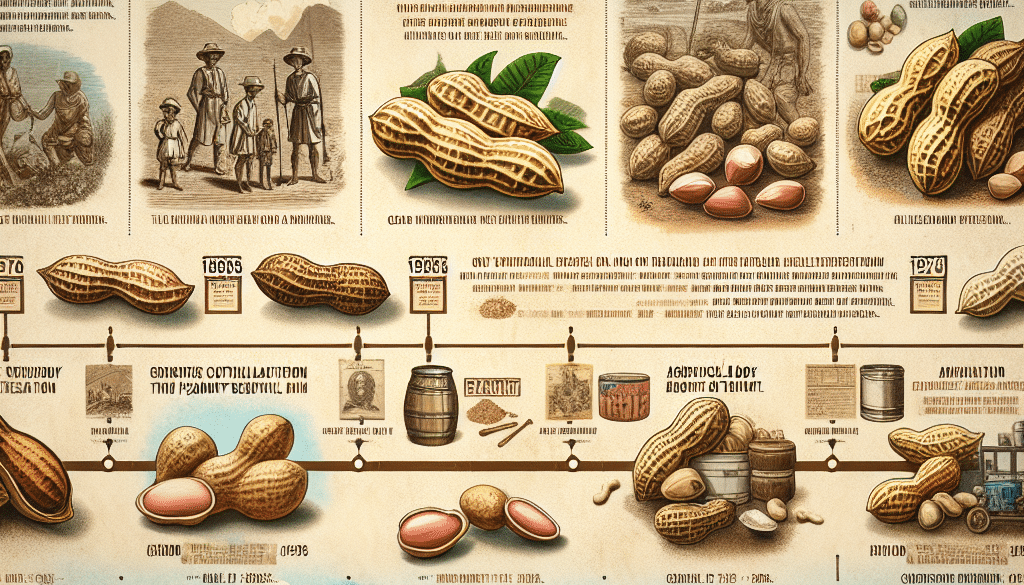Peanuts Origin: Tracing The Nutty Beginnings
-
Table of Contents
- Peanuts Origin: Tracing the Nutty Beginnings
- The Ancestral Roots of Peanuts
- From South America to the World
- Peanuts in Africa: A New Chapter
- The Journey to North America
- Modern Cultivation and Breeding
- Peanuts in Culture and Cuisine
- Health Benefits and Nutritional Value
- Conclusion: The Global Legacy of Peanuts
- Discover ETprotein’s Premium Protein Products
Peanuts Origin: Tracing the Nutty Beginnings

The humble peanut, a staple in diets around the world, has a rich history that spans continents and cultures. Known for its versatility and nutritional value, the peanut is not actually a nut but a legume, related more closely to beans and lentils than to almonds and walnuts. This article delves into the fascinating origins of peanuts, exploring how they have become a global phenomenon and an integral part of culinary traditions worldwide.
The Ancestral Roots of Peanuts
Peanuts, scientifically known as Arachis hypogaea, are believed to have originated in South America, with archaeological evidence suggesting that ancient cultures in modern-day Bolivia and Peru cultivated peanuts over 7,600 years ago. These early peanut varieties were likely quite different from the ones we consume today, as centuries of selective breeding have shaped their size, taste, and growth patterns.
- Early cultivation in South America
- Selective breeding and domestication
- Spread to other continents through exploration and trade
From South America to the World
The spread of peanuts from South America to other parts of the world is a story of exploration and trade. Spanish and Portuguese explorers encountered peanuts in their travels and brought them back to Europe. From there, peanuts made their way to Africa and Asia via European traders and explorers.
- Introduction to Europe by Spanish and Portuguese explorers
- Subsequent spread to Africa and Asia
- Adoption and adaptation in various cultures
Peanuts in Africa: A New Chapter
In Africa, peanuts found a new home. They thrived in the continent’s diverse climates and became an essential crop, especially in West Africa. African cuisines incorporated peanuts into a variety of dishes, from stews and sauces to ground pastes. The legume’s high protein content made it a valuable food source in regions where meat was scarce or expensive.
- Integration into African cuisines
- Role in food security and nutrition
- Influence on the transatlantic slave trade
The Journey to North America
Peanuts were introduced to North America during the transatlantic slave trade, where enslaved Africans brought knowledge of peanut cultivation and recipes with them. In the United States, peanuts initially were considered food for the poor and were used primarily as animal feed. However, the Civil War and the innovative work of individuals like George Washington Carver helped to elevate the status of peanuts.
- Introduction through the transatlantic slave trade
- Initial perception as a food for the poor
- George Washington Carver’s influence on peanut agriculture and uses
Modern Cultivation and Breeding
Today, peanuts are cultivated worldwide, with China, India, and the United States being the top producers. Modern breeding techniques have led to improved varieties that are more disease-resistant, higher yielding, and better suited for different climates and soils. The peanut industry has become a significant economic force, with peanuts used in a myriad of products from food to cosmetics.
- Top global producers of peanuts
- Advancements in breeding for better yield and disease resistance
- Economic impact of the peanut industry
Peanuts in Culture and Cuisine
Peanuts have left an indelible mark on cultures and cuisines around the world. In the United States, peanut butter is a beloved staple, while in China, boiled peanuts are a common snack. In West Africa, peanuts are used to make rich sauces and stews, and in India, they are often included in savory mixes and sweets.
- Peanut butter’s popularity in the United States
- Boiled peanuts as a snack in China
- Peanuts in West African and Indian cuisines
Health Benefits and Nutritional Value
Peanuts are not only delicious but also packed with nutritional benefits. They are an excellent source of protein, healthy fats, vitamins, and minerals. Regular consumption of peanuts has been associated with a reduced risk of heart disease and other chronic conditions. However, it’s important to be mindful of peanut allergies, which can be severe and life-threatening for some individuals.
- High protein and healthy fat content
- Rich in vitamins and minerals
- Health benefits and considerations for allergies
Conclusion: The Global Legacy of Peanuts
The journey of the peanut from its origins in South America to its current status as a global commodity is a testament to its adaptability and appeal. Through centuries of cultivation, trade, and culinary innovation, peanuts have become an integral part of diets and cultures across the world. Their rich history is mirrored in the diverse ways they are consumed and celebrated today.
Discover ETprotein’s Premium Protein Products
If you’re looking for high-quality protein sources to complement your diet, consider ETprotein’s range of organic bulk vegan protein and plant proteins. Their products, including peanut protein, are known for their neutral taste and non-GMO, allergen-free attributes, making them a perfect addition to any health-conscious lifestyle.
ETprotein caters to a wide array of industries, from nutraceuticals to food and beverage, ensuring that you have access to the best protein solutions for your needs. Whether you’re a distributor, trader, or manufacturer, ETprotein’s commitment to quality and customer satisfaction makes them a top choice for protein products.
For more information or to sample their products, reach out to ETprotein and discover how their protein offerings can enhance your offerings and support your customers’ health and wellness.
About ETprotein:
ETprotein, a reputable protein Chinese factory manufacturer and supplier, is renowned for producing, stocking, exporting, and delivering the highest quality organic bulk vegan protein and plant proteins. They include Organic rice protein, clear rice protein, pea protein, clear pea protein, pumpkin seed protein, sunflower seed protein, mung bean protein, peanut protein etc. Their offerings, characterized by a neutral taste, non-GMO, allergen-free attributes, cater to a diverse range of industries. They serve nutraceutical, pharmaceutical, cosmeceutical, veterinary, as well as food and beverage finished product distributors, traders, and manufacturers across Europe, USA, Canada, Australia, Thailand, Japan, Korea, Brazil, and Chile, among others.
ETprotein specialization includes exporting and delivering tailor-made protein powder and finished nutritional supplements. Their extensive product range covers sectors like Food and Beverage, Sports Nutrition, Weight Management, Dietary Supplements, Health and Wellness Products, and Infant Formula, ensuring comprehensive solutions to meet all your protein needs.
As a trusted company by leading global food and beverage brands and Fortune 500 companies, ETprotein reinforces China’s reputation in the global arena. For more information or to sample their products, please contact them and email sales(at)ETprotein.com today.












